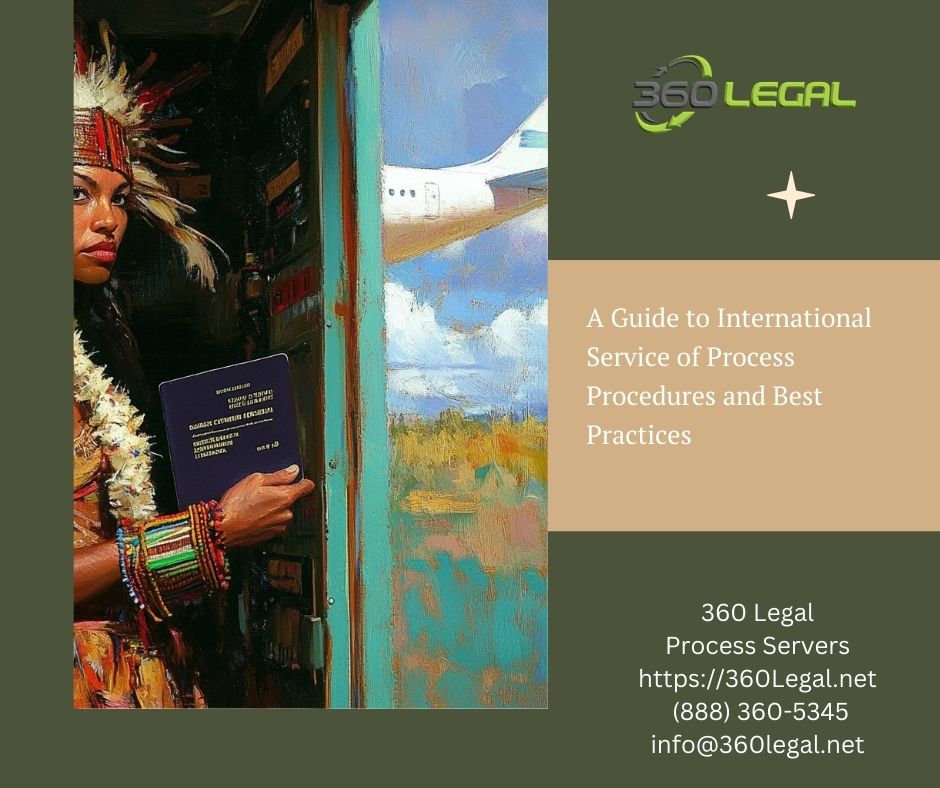Testing RSS Feeds.. ignore post.
Testing RSS Feeds.. ignore post.
A Guide to International Service of Process Procedures and Best Practices

A Guide to International Service of Process Procedures & Best Practices
 What are the key procedures for international service of process?
What are the key procedures for international service of process?
The key procedures include adhering to international treaties like the Hague Service Convention, understanding state-specific requirements, and leveraging trusted legal partners. This guide explores these processes in depth, providing a comprehensive overview for legal professionals.
Understanding International Service of Process
International service of process refers to the formal delivery of legal documents across international borders to ensure that all parties are informed of their involvement in a legal matter. It is a critical step in upholding due process and maintaining the integrity of judicial proceedings.
This process is governed by various international treaties, domestic laws, and state-specific regulations. While the Hague Service Convention is the most widely recognized treaty, other frameworks, such as bilateral agreements and letters rogatory, may also apply.
 Procedures Across 360 Legal’s States
Procedures Across 360 Legal’s States
At 360 Legal, we operate in six states: Florida, Alabama, Arkansas, Colorado, Georgia, and Missouri. Here are the specific considerations for each:
- Florida: Florida requires adherence to international treaties, with strict compliance to ensure proper delivery and proof of service.
- Alabama: Alabama emphasizes detailed documentation and adherence to the Federal Rules of Civil Procedure for international cases.
- Arkansas: In Arkansas, serving documents internationally often involves coordinating with federal courts to ensure compliance with both state and international laws.
- Colorado: Colorado highlights the need for meticulous record-keeping and certified translations when serving documents internationally.
- Georgia: Georgia permits alternative methods of service for non-Hague Convention countries but stresses the importance of judicial oversight.
- Missouri: Missouri often requires diplomatic channels for service in countries without formal agreements, necessitating careful planning.
Understanding these distinctions ensures that legal documents are served properly, minimizing the risk of jurisdictional challenges.
Best Practices for International Service
Successful international service of process requires attention to detail and a deep understanding of applicable laws. Here are best practices to consider:
- Adherence to Treaties: Always comply with the Hague Service Convention or other applicable treaties to ensure legitimacy.
- Verify Local Laws: Research the specific requirements of the destination country and align them with state and federal rules.
- Certified Translations: Provide accurate translations of all documents to avoid delays or refusals.
- Professional Partners: Work with experienced process servers who specialize in international cases, such as 360 Legal.
- Maintain Clear Records: Document every step of the process, including delivery attempts and communications with foreign authorities.
By implementing these practices, legal professionals can navigate international service with confidence and efficiency.
Challenges and How to Overcome Them
International service of process is not without its difficulties. Common challenges include:
- Varying Legal Systems: Each country has unique judicial protocols that may conflict with U.S. requirements.
- Delays: Processing through diplomatic channels or foreign courts can take months.
- Cost: International service often incurs higher fees for translations, courier services, and legal assistance.
To overcome these obstacles, thorough preparation and partnerships with knowledgeable service providers are essential.
Why Does International Service of Process Matter to Your Business?
For law firms, insurance companies, and other entities, international service of process ensures legal compliance and protects case integrity. Mishandling this process can result in dismissed cases, reputational damage, and financial losses. By working with trusted partners like 360 Legal, you can mitigate these risks and achieve successful outcomes.
Conclusion
International service of process is a complex but crucial component of global legal proceedings. With state-specific expertise and a commitment to excellence, 360 Legal provides the guidance and reliability needed to navigate these challenges successfully. Contact us today to learn more about our international service capabilities.
Need reliable international service of process? Contact 360 Legal to ensure your legal documents are served accurately and efficiently, no matter where they need to go.
Frequently Asked Questions
- What is the Hague Service Convention? It is an international treaty that standardizes procedures for serving legal documents abroad, ensuring compliance with foreign jurisdictions.
- How does 360 Legal handle international service of process? We leverage state-specific expertise, global partnerships, and a commitment to integrity to provide seamless service.
- What happens if a country is not part of the Hague Convention? Alternative methods, such as letters rogatory or diplomatic channels, are employed to ensure proper service.
Author
We are Social!
Latest tweets
Popular Tags
Testimonials
"5 star service ! prompt serving, helpful, professional . "
"Mike is awesome. Our firm has hired him on several occasions and we are very happy with his work. His prompt serving, helpful, professional and always in communication. I recommend him highly! "
"360Legal provides speedy and easy to use Process Service that is flexible, and very transparent with nearly instant reporting. It is very helpful for us to be able to track the status of our process service jobs, especially when they are time sensitive. "
Latest News
-

RMAI 2021 Annual Conference RMAI Annual Conference
April 12-15, 2021 -

NATIONAL CREDITORS BAR ASSOCIATION 2020 SPRING CONFERENCE
May 19-21, 2021 -

ALFN ANSWERS 2021
Jul 18-21, 2021 -

Annual Convention and Expo
Oct. 17-21, 2021 -

Florida Association of Professional Process Servers 33rd Quarter Board Meeting/Professional Beach Getaway
Aug. 20-22, 2021












